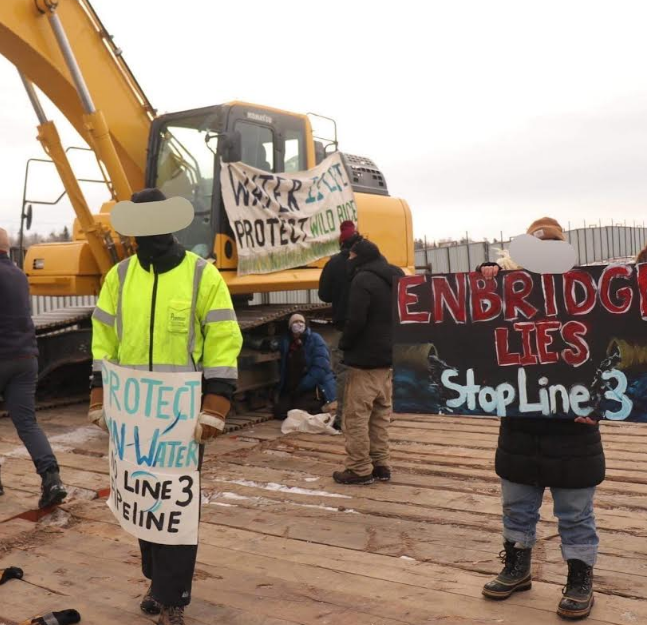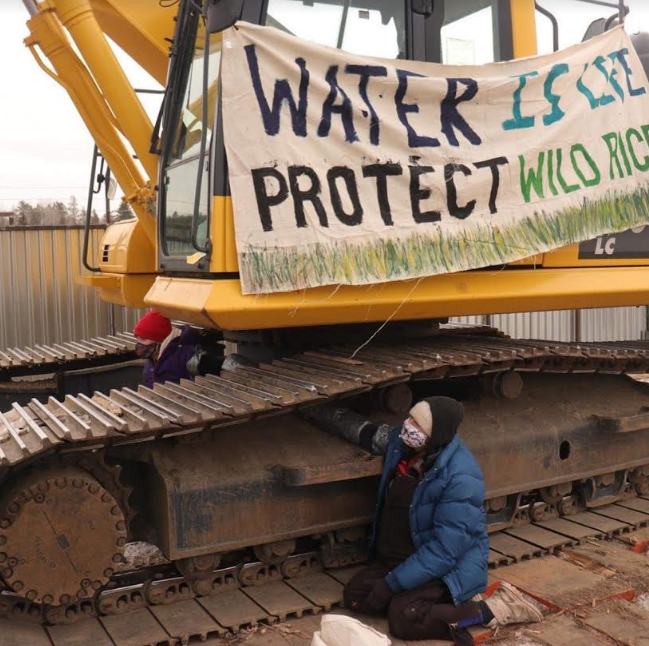
- Details
- By Darren Thompson
TWO INLETS, Minn. — Early this morning, two people locked themselves to equipment used for Enbridge’s Line 3 tar sands oil pipeline in northern Minnesota. The action was organized by the Giniw Collective and comes days after various permits were granted in the state of Minnesota, pushing the highly controversial pipeline closer to construction.
“Gov. Walz said we need to act boldly on climate,” Tara Houska (Ojibwe), founder of the Giniw Collective, told Native News Online. “Then he approved the largest tar sands infrastructure project in North America through Anishinaabe territory.”
“Having grown up on occupied Anishinaabe and Dakota land, I feel a responsibility to defend that land and the rights of the people who have a relationship to it,” Mira Grinsfelder, 24 of Saint Paul, Minn., said in a statement prior to locking herself up to Enbridge equipment.
“If the US government won’t defend Anishinaabe treaty rights, we will. If the Minnesota government won’t protect the water, we will,” added Grinsfelder.
 Activist locked to a bulldozer to stop construction.
Activist locked to a bulldozer to stop construction.
Native News Online reported on Thursday, Nov. 12, the Minnesota Department of Natural Resources and the Minnesota Pollution Control Agency (MPCA) approved various permits for Enbridge’s Line 3. The result brought hundreds of people in protest at the Governor’s Mansion on Saturday, clashing with a pro-Trump rally with people voicing they support pipelines.
Yesterday, Minnesota Public Radio (MPR) News reported that 12 out of 17 MPCA advisory group members resigned in protest over the approval of MPCA Commissioner Laura Bishop approval for a key water permit that pushes Line 3 closer to construction. White Earth tribal member and former Green Party Vice-Presidential candidate Winona LaDuke is one of the twelve that resigned.
“We cannot continue to legitimize and provide cover for the MPCA's war on black and brown people," their resignation letter stated.
Enbridge’s Line 3 is the largest project in the company’s history and would be one of the largest crude oil pipelines in the continent, according to a statement on the company’s website. Line 3 is expected to transport up to 760,000 barrels a day through northern Minnesota, passing through treaty lands of several Ojibwe bands.
To date, five Ojibwe bands have resisted the pipeline replacement project in court: White Earth, Red Lake, Mille Lacs, Fond du Lac, and Leech Lake. Canada, North Dakota, and Wisconsin have all approved their segments of the pipeline.
“If his [Gov. Walz’s] administration won’t stand up to big oil, we will,” added Houska.
More Stories Like This
Trump signs law that revokes some limits on drilling in Alaska’s National Petroleum ReserveSouthern Sierra Miwuk Nation Gets 900-Acres ofLand Back
Chilkat Indian Village Tells New Palmer Mine Owners They Are “Not Welcome” in Chilkat Valley
Tribes, Coastal Group Ask Army Corps to Revoke Permit for Texas Export Terminal
Michigan Tribes Tell Supreme Court: Don’t Bail Out Enbridge
Help us defend tribal sovereignty.
At Native News Online, our mission is rooted in telling the stories that strengthen sovereignty and uplift Indigenous voices — not just at year’s end, but every single day.
Because of your generosity last year, we were able to keep our reporters on the ground in tribal communities, at national gatherings and in the halls of Congress — covering the issues that matter most to Indian Country: sovereignty, culture, education, health and economic opportunity.
That support sustained us through a tough year in 2025. Now, as we look to the year ahead, we need your help right now to ensure warrior journalism remains strong — reporting that defends tribal sovereignty, amplifies Native truth, and holds power accountable.
 The stakes couldn't be higher. Your support keeps Native voices heard, Native stories told and Native sovereignty defended.
The stakes couldn't be higher. Your support keeps Native voices heard, Native stories told and Native sovereignty defended.
Stand with Warrior Journalism today.
Levi Rickert (Potawatomi), Editor & Publisher
